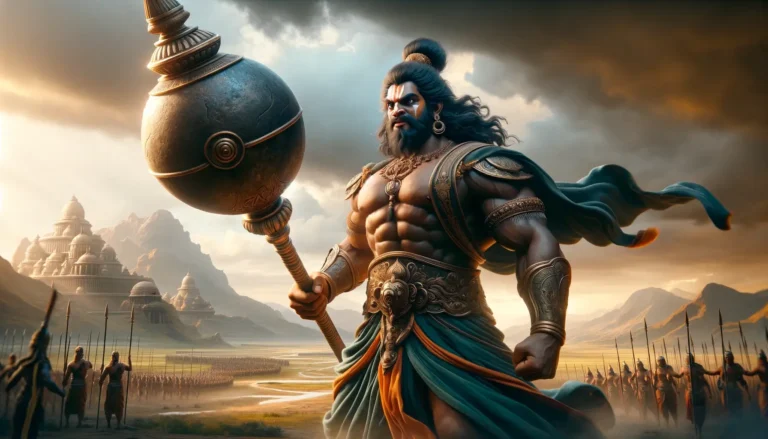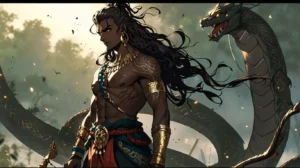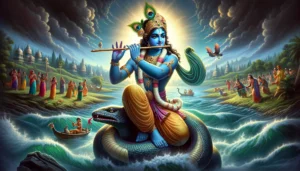In the sprawling epic of the Mahabharata, one character stands out for his unparalleled physical prowess, indomitable spirit, and unwavering loyalty—Bhima, the second son of Kunti and Vayu, the god of wind. Renowned for his colossal strength, fearless demeanor, and boundless courage, Bhima’s life and deeds weave a tapestry of heroism and glory that resonates throughout the annals of Indian mythology and literature. In this comprehensive article, we delve into the multifaceted persona of Bhima, exploring his origins, character traits, and instances of glory that have immortalized him as one of the most iconic figures in the Mahabharata.
Origins and Lineage
Bhima’s birth is steeped in divine origin and auspicious signs. Born to Kunti, the mother of the Pandavas, and Vayu, the god of wind, Bhima’s lineage endowed him with exceptional strength and vitality from the moment of his conception. His birth was foretold by sages and heralded by celestial omens, signaling his destined role in shaping the events of the Mahabharata. Raised alongside his brothers—Yudhishthira, Arjuna, Nakula, and Sahadeva—Bhima’s childhood was marked by camaraderie, rivalry, and a deep bond forged through shared experiences and trials.
Quote: “Strength is life, for the strong have the right to rule.” – Bhima (Mahabharata)
This quote from Bhima underscores the importance of strength and valor in the epic narrative, highlighting his belief in the supremacy of the strong.
Character Traits and Attributes
Bhima is characterized by his towering physique, unmatched strength, and fiery temperament. His physical prowess knows no equal, as he possesses the ability to uproot trees, slay demons, and overpower adversaries with sheer brute force. Yet, beneath his rugged exterior lies a compassionate heart and a fierce sense of justice, which guide his actions and decisions throughout the epic. Bhima’s loyalty to his family and unwavering commitment to righteousness make him a formidable ally and a fearsome opponent on the battlefield.
Quote: “I would rather live in a hut with my brothers than in a palace with our enemies.” – Bhima (Mahabharata)
This quote illustrates Bhima’s deep sense of loyalty and solidarity with his family, emphasizing his willingness to sacrifice personal comfort for the sake of his loved ones.
Instances of Glory
Bhima’s life is punctuated by numerous instances of glory and valor, each showcasing his extraordinary abilities and unwavering resolve. One such instance occurs during the infamous game of dice, where the Pandavas are humiliated and exiled to the forest for thirteen years. Despite their predicament, Bhima remains undaunted, channeling his rage and determination into a vow of vengeance against their enemies. His resolve is further demonstrated in his encounter with the demon Hidimba, whom he defeats and later marries, forging an alliance that aids the Pandavas in their journey.
Quote: “I will crush the pride of those who seek to oppress the weak and the innocent.” – Bhima (Mahabharata)
In this quote, Bhima pledges to stand up against injustice and tyranny, highlighting his commitment to protecting the vulnerable and upholding righteousness.
Another notable feat of Bhima’s strength occurs during the construction of the great palace of wax, where the Pandavas are lured into a trap by their cousins, the Kauravas. Imprisoned within the flammable structure, Bhima utilizes his immense strength to break free, rescuing his brothers and escaping the clutches of their adversaries. This act of valor serves as a testament to Bhima’s resourcefulness and his unwavering commitment to his family’s safety and well-being.
Bhima’s prowess on the battlefield is showcased in numerous encounters throughout the Mahabharata, where he emerges as a formidable warrior capable of single-handedly turning the tide of battle. His epic duel with Duryodhana during the Kurukshetra War is a prime example of his martial skill and indomitable spirit. Despite being outnumbered and facing formidable opponents, Bhima’s ferocity and determination propel him to victory, culminating in a climactic showdown that seals the fate of the Kaurava army.
Character Development and Moral Complexity
Despite his heroic feats and unwavering loyalty, Bhima’s character is not without flaws and moral complexity. His impulsive nature often leads him into conflicts and confrontations, where his brute strength serves as both a blessing and a curse. Bhima’s rivalry with his cousin, Duryodhana, is fueled by years of resentment and animosity, culminating in a bitter feud that drives the narrative towards its tragic conclusion. Yet, beneath his gruff exterior, Bhima harbors a deep sense of honor and integrity, which ultimately guide his actions and decisions towards righteousness and justice.
Quote: “Strength without wisdom is like a weapon without aim.” – Bhima (Mahabharata)
This quote from Bhima reflects his recognition of the importance of wisdom and discernment in wielding power responsibly, underscoring his journey towards moral maturity and self-awareness.
Legacy and Cultural Significance
Bhima’s legacy extends far beyond the events of the Mahabharata, leaving an indelible mark on Indian culture and literature. His heroic deeds and larger-than-life persona have inspired countless retellings, adaptations, and artistic interpretations, cementing his status as a cultural icon and folk hero. Bhima’s unwavering courage, fierce loyalty, and unyielding spirit continue to resonate with audiences across generations, serving as a timeless reminder of the enduring power of strength, valor, and righteousness.
Conclusion
In conclusion, Bhima emerges as one of the most iconic and beloved characters in the Mahabharata, embodying the virtues of strength, courage, and loyalty. His life and deeds exemplify the timeless themes of heroism, sacrifice, and moral complexity that define the epic narrative. Through his indomitable spirit and unwavering resolve, Bhima inspires readers to confront adversity with courage, face challenges with determination, and uphold righteousness in the face of temptation and turmoil. As a legendary figure whose legacy transcends time and space, Bhima continues to captivate and inspire audiences with his epic tale of valor and glory in the Mahabharata.



Was Barbarik’s ability to fight with his own severed head truly a display of supernatural power, or was it simply a clever illusion to strike fear into his enemies?”,
“refusal
[…] of a perfect friend, a warrior equal to Arjuna in archery, and he possesses the strength of Bhima. Like Yudhishthira, he has a deep understanding of dharma, and, like Nakula, he is exceptionally […]